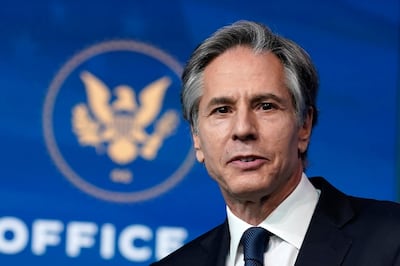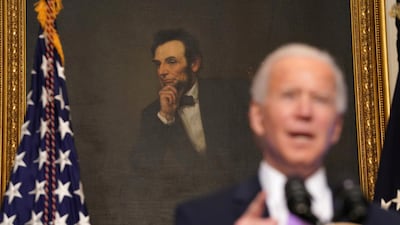On Tuesday, US President Joe Biden's longtime aide Antony Blinken was sworn in as Secretary of State, as America's top diplomat is known. Washington's foreign policy team is taking shape.
Many of its members worked for the Obama administration. US allies – particularly those in the Middle East – will be watching closely, wanting to know if lessons have been learnt from the past.
The team's experience will mean little if their strategies do not take into account how the region has evolved. They must build back the trust of allies, much of which was put into question after years of contradictory US Middle East policy.
Mr Biden is pushing for progress on Palestine, and that is greatly welcomed. Last year's signing of the Abraham Accords, which established diplomatic relations between the UAE and Israel, followed by other Arab countries, paved the way for a safer region and one moving towards peace. Mr Biden can build on these accords and push Israel to work towards a two-state solution and deliver more hope and certainty for Palestinians.

The US acting ambassador to the UN has indicated the new administration supports the two-state solution, that it will re-open Palestine's mission in Washington and restore funding to UNRWA, the UN refugee agency that supports Palestinians displaced by the crisis. More diplomacy and more aid for Palestinians is not a threat to Israel. They are moral pursuits to rebuild confidence among Palestinians that the US can be a friend and advocate.
While Palestine is of importance to the region and the world, another pressing issue is that of Iran and its behaviour that threatens the region.
Tehran, via its various proxies, is testing Mr Biden at the expense of security in the Gulf and elsewhere. Drones are threatening Saudi cities and Houthis continue to hold the region's ecology hostage with the terrible prospect of disaster on the FSO Safer, a stranded and decaying oil tanker that has the potential to cause one of the worst oil spills in history.
Mr Biden hopes for a new nuclear deal with Tehran. A return to the terms of the previous deal – which did nothing to curb the activity of Iran's proxies or its ballistic missile programme – would destroy trust at a time when Iran threatens American allies. To rebuild faith in American Middle East policy, the concerns of US regional allies must be heeded in any future agreement.
Mr Biden must also rebuild confidence throughout the Middle East that America keeps its word. When Mr Obama failed to enforce his red lines against the use of chemical weapons in the Syrian civil war, nefarious forces around the world were emboldened to press ahead with abuses, no longer fearing an American response. Sudden troop withdrawals during the last administration endangered Kurdish allies in their fight against ISIS and left them vulnerable to Turkish expansionism. And secretly liaising with the Iranian regime for months led to an erosion of trust in how the US treats its partners.
Mr Biden's main asset confronting today's Middle East will be his reputation for competent and steady policymaking. This means that he and his team need to acknowledge how the region has changed and how America's relationship with it has also changed.


